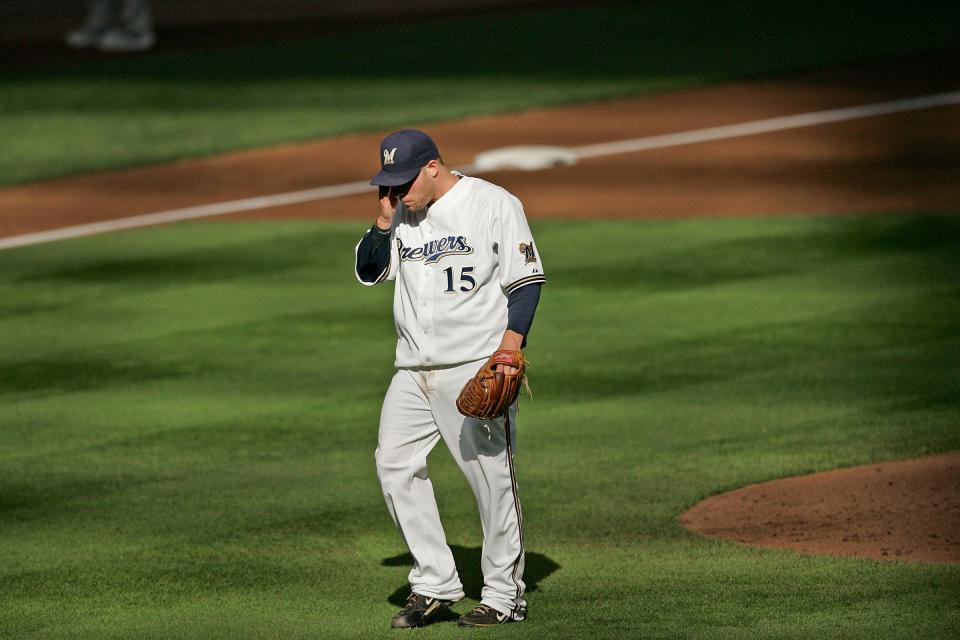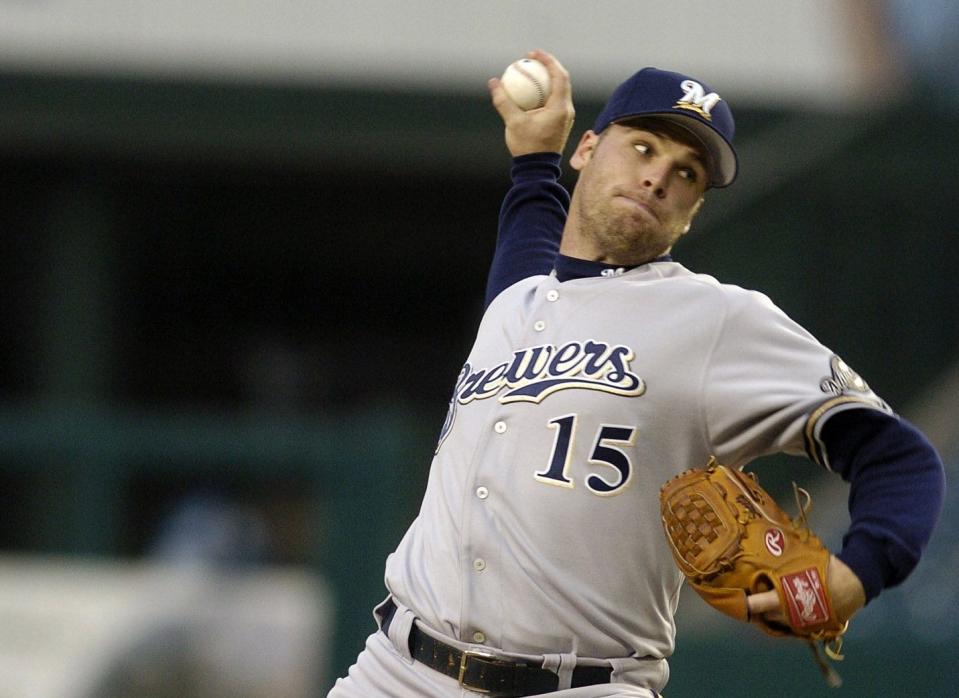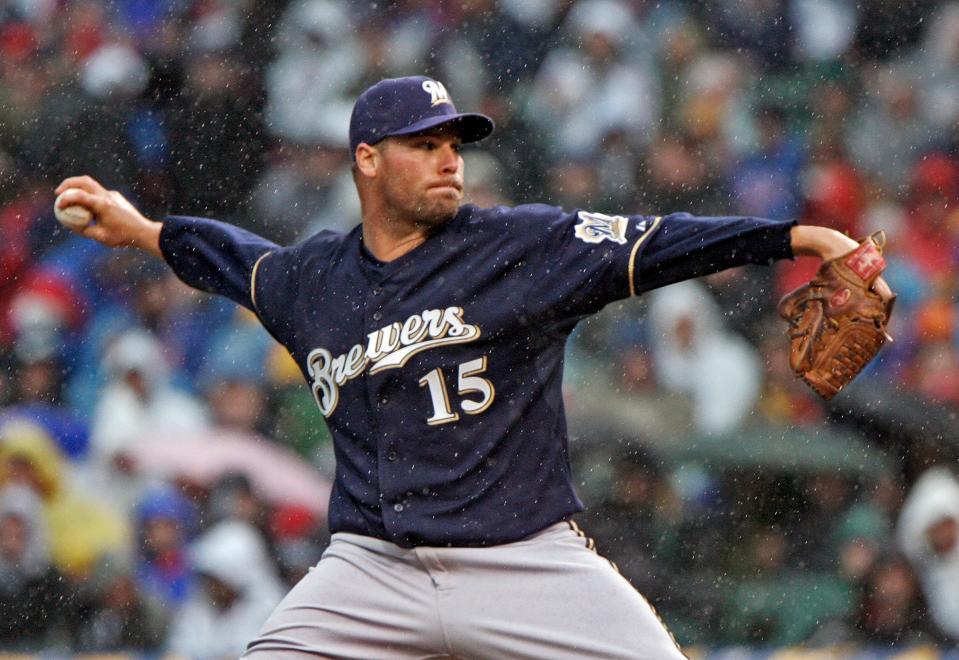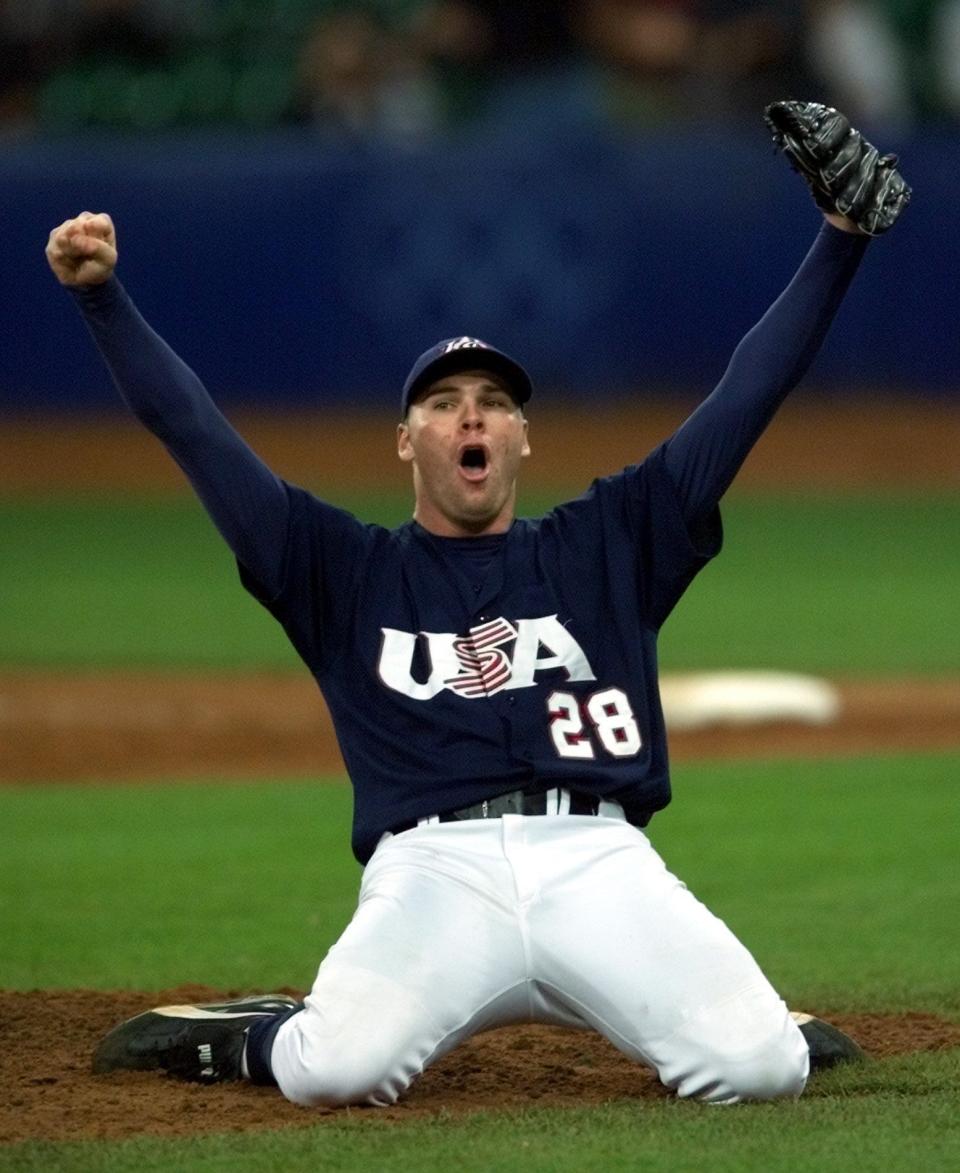Walk of Fame inductee Ben Sheets ushered in a new Brewers era but was kept out of the promised land

When you think of the 2008 Milwaukee Brewers season, you may not immediately picture Ben Sheets.
It's about CC Sabathia's midseason acquisition and stunning second-half run, punctuated by a series of starts on three days of rest. It's Ryan Braun's home run in the eighth inning against the Chicago Cubs in the season finale, allowing Sabathia to finish off a victory and send the Brewers to their first postseason in a generation. It's a September managerial change, Yovani Gallardo's return from an ACL injury, the late-season heroics of Braun and Prince Fielder.
And then perhaps Sheets, leaving the penultimate game of the season with an injury that would result in Tommy John surgery, force him to miss his first postseason after eight seasons in Milwaukee and cost him untold millions in free agency. The injuries that shortened his career are often held against his greatness, and his otherwise-spectacular 2008 season is swallowed up in time.
"At the end of the day, nobody cares if you're not successful. That's just the nature of the beast," Sheets said Thursday. "If I go out there and pitch and they hit line drives right at people and it's 2-1 and we win the game, I'm Willis Reed. But I understand fans' frustration with that. I'm a sports fan, too, and I get frustrated with injuries. Unfortunately, it's just part of the game."
Sabathia rightly gets credited for risking his own free agency by working on an intensified schedule to will Milwaukee to the playoffs. Sheets also tried to push his physical boundaries, but pain in his forearm and elbow forced him to leave the third inning of his final start in a Brewers uniform. The Cubs had already scored four runs and were on their way to putting Milwaukee in a must-win situation the next night.
"I was going into free agency and I had set myself up really nice," Sheets said. "Looking back, if I'm just a business guy and I stop at the first twinge, I'm probably fine and I probably make a boatload of money, probably get my arm fixed while I'm under contract and all that other stuff. I still wouldn't go that route because to me it wouldn't sit right if I didn't try and see if I could help the team."

Sheets had shaken the injuries that had truncated the preceding three seasons. That year he became the first (and still only) Brewers pitcher to start the All-Star Game, and if he hadn't pitched in that final series, Sheets would have finished 2008 with an ERA under 3.00 for the second time in his career. Instead, he watched his teammates celebrate, knowing his own future was in jeopardy.
"That was a crappy situation, individually," he said. "We had worked so hard from '01 when I got there to put ourselves in that position. … To see guys take advantage of big moments was pretty nice, pretty insane. Braun was one of my favorite teammates. Him to have that moment and CC (getting added) was a big shot in the arm. When you look back, it is 'what could have been.' You pick up CC, and as soon as we get Yovani back from injury, I'm getting injured. What if you've got them three at one time? It's probably a whole different scenario."
Instead, Sheets is the Brewers' Moses, the pitcher who shepherded the Brewers through years of sub-.500 baseball to become a playoff-caliber squad. But he wasn't allowed to enjoy the promised land.
On Aug. 26, one day after Sabathia returns to Milwaukee for the 15th anniversary of that 2008 run, the franchise will honor Sheets with something even more concrete, adding him to the Brewers' most hallowed institution, the Walk of Fame.
"I didn't pitch just to have a job. I pitched because I actually enjoyed pitching," Sheets said. "That's still what I miss today, the actual playing of the game. It ain't as much the locker room like people talk about or traveling or stuff like that. I miss the actual game of baseball."

Sheets was the first piece to arrive for a franchise finally figuring it out
When you think of the 2004 Milwaukee Brewers season, you should immediately picture Sheets.
He struck out a franchise-record 18 batters against the Atlanta Braves on May 16, an individual mark that's only been matched twice since in Major League Baseball, by Cy Young Award winners Max Scherzer and Corey Kluber. Armed with the killer curveball that he learned spinning a tennis ball in his back yard and bolstered by Miller Park's deceptive daytime shadows, Sheets struck out the final six batters he faced.
"The breaking ball was what stuck out and how many people that were just swinging at balls; if you watch the video, heck, I may not have even swung at these balls," Sheets said. "But that day, everything was going right. I did enough early to get to them shadows late, and anybody who hits (in Milwaukee) knows it's hard to hit in them shadows. But I always joke, them shadows are there every day game for 22 years. Everybody's got the same opportunity. To do it that day was just special."
He carried a perfect game into the seventh against the Angels in June, a game the Brewers would go on to win in 17 innings, 1-0. He struck out a franchise-record 264 batters in 237 innings, closing strong with his fourth complete game of the season to beat St. Louis.
Sheets had a 2.70 ERA and 0.983 WHIP but only a 12-14 record for the Brewers, a team that won only 67 games. In an era that still prioritized the win-loss ledger over other stats, he finished eighth in the Cy Young voting.
The real improvement for the organization began after that. J.J. Hardy, Rickie Weeks, Fielder and Corey Hart arrived permanently in 2005, and the Brewers finished .500 for the first time since 1992. Sheets, stricken with a strange inner-ear infection, made only 22 starts.
"I pitched in Houston with an upper respirtaory virus," Sheets said. "I just remember how much I was sweating and all this other stuff. The virus must have attacked my inner ear. … When I woke up (the next day), the world was spinning. I went to my knees and I just started throwing up. I spent like two days in the hospital. I couldn't even open my eyes because the whole world was going to the left."
Sheets said while the rest of the world was assuming he was "just a little bit dizzy," he was spending two to three weeks trying to "re-teach my brain to balance."
"That was a really weird injury that unless you get it, you don't realize (the severity)," he said.
With Sheets battling a shoulder issue, the Brewers slid backward in 2006. But the Brewers had a winning team in 2007, bolstered by rookie of the year Braun. Sheets threw a two-hit complete game on opening day against the Los Angeles Dodgers, though a sprained finger and hamstring issue shortened his second half.
He was on the hill again in 2008 for a rain-soaked opener at Wrigley, where the Brewers lost a late lead but rallied to win in extra innings. The wild ride was just beginning.

"That '08 season was a good season for me," Sheets said. "It takes two halves. If the guys who had good first halves didn't have good first halves, would you make a move for CC? Would you even be in position to do that? But I get it. Nobody cares about the forefront. If a guy struggles all year but then goes 7-for-10 in the World Series, (he's the hero)."
Sheets, whose gold-medal game performance in the 2000 Olympics lifted the United States to an improbable win over Cuba, always felt he showed up in the biggest games, and he said the velocity readings from those outings proved it.
"I always thought if I could get to the postseason and pitch, I could really open more eyes with my ability," he said.

Sheets will be back for a celebration Aug. 26 in Milwaukee for the Walk of Fame
Even without that notch on his career résumé, Sheets will earn something that's been bestowed to only 22 Milwaukee baseball personnel: the Walk of Fame. Among Brewers players, he'll be joined by Hank Aaron, Cecil Cooper, Prince Fielder, Rollie Fingers, Jim Gantner, Teddy Higuera, Geoff Jenkins, Paul Molitor, Don Money, Gorman Thomas and Robin Yount.
"It's probably the top honor that my career is going to allow me to get, which is really cool," Sheets said. "To reach that and be honored in that way, it's quite humbling. It's something I didn't think about, but when they called, I thought that was pretty unbelievable."
Sheets came to Milwaukee when Fielder was inducted in 2022, and he joked that traveling secretary Dan Larrea hooked his family up with tickets in the fourth-deck Uecker seats. The Sheets family, including wife Julie and sons Seaver and Miller (yes, named for the stadium) visited the State Fair last year for the first time.
"It's still a beautiful stadium, still a great place to watch a game," Sheets said. "A summer in Milwaukee is hard to beat, man. It really is."
This article originally appeared on Milwaukee Journal Sentinel: Ben Sheets helped get Brewers there but never got to enjoy playoffs

